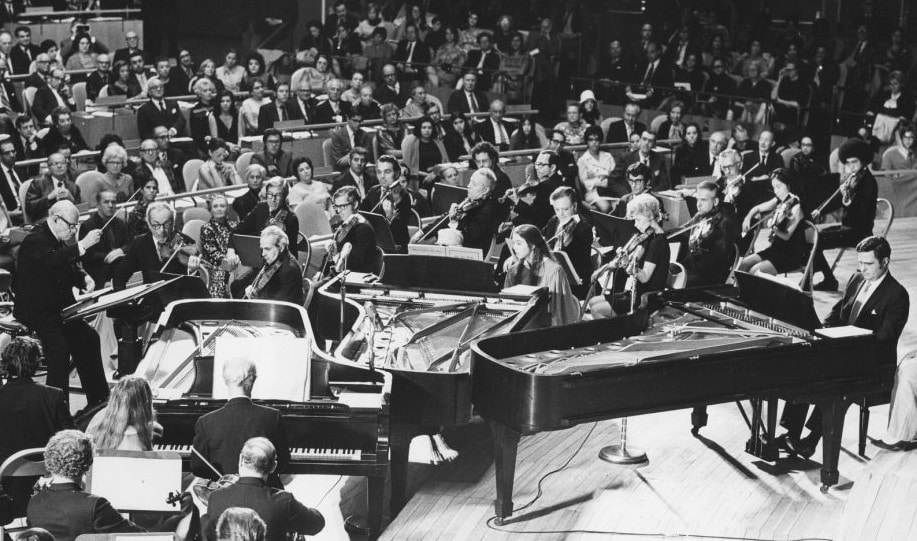Just in: Taiwan dumps Netrebko ‘due to Putin ties’
NewsThe National Symphony Orchestra of Taiwan has cancelled a March 5 performance by Anna Netrebko ‘after controversy over her links with the Russian President Vladimir Putin’.
The Ministry of Culture issued a statement saying that, though it respected the orchestra’s independence, there could be no ambiguity about Taiwan’s position on the war in Ukraine.
There were additionally, it said, ‘ concerns over public opinion’.






Good for them. Taiwan, as we all know, is in China’s crosshairs, with China, in turn, backing up Putin’s criminal invasion of Ukraine. The entire world is dependent on Taiwan for semiconductors, too (albeit not the kind of semiconductors we have in music today – He He). All in all, Taiwan cannot afford to be entertained by a Putin house pet.
Gosh, why would Taiwan be worried about a big country invading a small one over territorial claims? Netrebko has clearly–even if perhaps opportunistically–denounced the invasion of Ukraine, but she has become too valuable of a symbol for denouncing Russia to fairly consider her stance. With her fame and Eurasian appearance, she is the perfect public figure for stirring militaristic hatred.
Netrebko has thus become a Prugelknabbe as the German’s say. In English, it is called a whipping boy. A whipping boy was a boy educated alongside a prince (or boy monarch,) who received corporal punishment for the prince’s transgressions in his presence. Seeing a friend punished would provide an equivalent motivation not to repeat the offence. An earlier proverb described “beating the dog before the lion.” So take warning any of you artists who might not see this war in the proper light.
From a larger perspective, history illustrates that war inevitably leads to a racist hatred of the enemy–all those gooks, Charlys, Japs, Krauts, Huns, Ragheads, and whatnot. When will we humans stop shaming ourselves with these insane wars and the hatred they create?
“ Gosh, why would Taiwan be worried about a big country invading a small one over territorial claims?” I assume this refers to mainland China’s claims over Taiwan. In international law, though – and unfortunately, China has a very strong claim.
At the Cairo Conference attended by Churchill and Roosevelt in WW2, it was agreed that territories stolen by Japan would be returned to their original sovereign powers at war’s end. This was later endorsed at the Potsdam Conference. Thus Singapore and Malaya were returned to the British who really had no business being there in the first place. Same with Indonesia and The Netherlands. Yet Beijing had been the sovereign power in Taiwan for a full 250 years before it was stolen by the Japanese. The mainland therefore had a much more legal claim on Taiwan than, say, the European colonial powers on the lands they reoccupied.
The USA was perfectly happy with this arrangement until Mao beat Chiang Kai Shek in 1949. The chorus in Washington for years thereafter was “Who lost China?” Terrified about a second large communist power, it then reneged on the Cairo/Potsdam agreements and switched its allegiance to the defeated power of Chiang who had fled to Taiwan. The US even called a special Conference in San Francisco to try and legitimize it. Britain was one of the countries who totally opposed that US move. But Chiang had never intended to remain in Taiwan. It was to be his base with weapons from the US which would enable him to reconquer China.
The present situation is largely the result of the US total about turn with Nixon’s visit in 1971. That of course was purely for political reasons but the US policy over Taiwan has been a total fudge since then. And whatever the future of the island, the US will have a great deal of soul searching should fears of an invasion materialize.
Some good points, though some might argue that the Cairo Conference was obeyed after WWII. The treaties did not cover later events such as the geographic divisions created by the Chinese civil war which ended four years later. Both sides should be working toward a peaceful solution. Even if the Western powers rightfully oppose Chinese hegemony, they still need to accept that Asia belongs to the Asians.
I am no communist but I fail to understand the thinking which claims that the Chinese civil war changed anything in terms of sovereignty and legality. It horrified and certainly changed thinking in Washington – but not its ally London. What you suggest seems to be that any country which decides to change its method of governance (for whatever reasons) is suddenly no longer a legal entity only because it pisses off the country which has been thrown into the role of the world’s policeman, this despite internationalism being anathema to a large majority of Americans prior to the war.
I do agree though that the Americans succeeded in introducing a large spanner in the works at San Francisco when they got the Japanese to cede China back to Chiang’s Republic of China. Even that is highly controversial, though, since Chiang no longer ruled mainland China. The fact that a country changed its name from the Republic of China to The People’s Republic of China should be totally irrelevant. Did changing the name of South Africa to The Republic of South Africa in any way change its geographical area, or the change from the Gold Coast to Ghana?
I’m not saying that the PRC has no claim to Taiwan, but that the treaties of the Cairo Conference might not be applicable to a secession of part of the country which came later. The problem should be solved peacefully. The belligerence of both sides is appalling.
“The problem should be solved peacefully.” That is what the accord signed between the US and China following Nixon’s visit states. But half a century ago the US was in a position to ensure that peaceful transition, and neither Taiwan nor China as weak dictatorships were in any position to argue. Is the US today in any position to oppose military action by such a huge military power as China, should it happen? Would the US public stand for it?China is vastly stronger than Russia and Taiwan, an island I love, is far smaller than Ukraine. I fear for the future if Xi gets his way.
getting my popcorn and a glass of Bordeaux before the show here…
I have another question. Who even thought of inviting Netrebko to Taiwan? You don’t think that she travels without her husband and son and doesn’t prefer business class, do you? A plane ticket costs at least $5,000 per person.
The contract for an artist of Netrebko’s stature would almost certainly have been signed more than a year ago – i.e. prior to the start of the war. I am also totally certain she would never have been making a one-off tour merely to perform just concert in Asia. Far more likely she was on a tour to Japan and perhaps Korea with at least half a dozen concerts to make it viable for her. If that was the case and Japan and/or Korea had earlier pulled out, she may have decided just to keep the Taiwan date. I am also certain Taiwan would never have been paying more than its contracted share of the pro-rated expenses. Living in that part of the world I have a pretty good handle on how contracts and orchestras work. Besides Taiwan is very dependent on the USA and would hardly have done anything that might have incurred displeasure in Washington!
I’m certain that @Nina merely made a guess that is incorrect – and one that is easily proven.